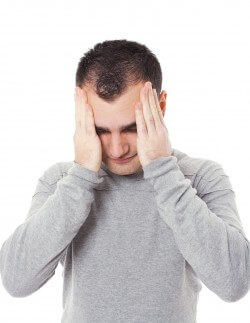
Prescription medications are often used to manage the symptoms of generalized anxiety disorder, a condition that causes intense feelings of worry and stress, combined with physical symptoms like high blood pressure, shortness of breath and a rapid heart rate. The National Institute of Mental Health (NIMH) reports that 3 percent of American adults have suffered from anxiety over the past year, and that out of this percentage, 32 percent of cases can be considered severe, requiring specialized treatment that may include psychoactive medication.
Drugs Used in Anxiety Treatment
Several of the medications that are commonly prescribed for anxiety have a high potential for abuse. Benzodiazepines like Xanax, Klonopin and Valium have been used to reduce tension and prevent the physical symptoms of anxiety, but these sedative medications can be habit-forming. In fact, Johns Hopkins Medicine estimates that one-third of the patients who take a benzodiazepine for anxiety for over 30 days develop a dependence on the drug.
Benzodiazepines are central nervous system depressants that can produce pleasurable feelings of relaxation and sedation. Because medications like Xanax act quickly, they can be taken to head off an episode of intense anxiety. But the longer you rely on benzodiazepines to manage your symptoms, the more vulnerable you are to drug dependence. If you find yourself growing agitated when you can’t take your dose of anxiety medication, or you need increasingly large doses to alleviate your symptoms, you may be developing a dependence on a prescription drug.
Using Prescription Drugs to Self-Medicate
According to the American Journal of Psychiatry, an anxiety disorder increases your risk of using prescription medications to manage your own symptoms. If your dose of prescribed medication is too low and your doctor refuses to increase the dosage, you may find yourself taking more of the medication to ease your symptoms. Or you might borrow, buy or steal prescription drugs from friends in order to help yourself feel better.
If you have an undiagnosed anxiety disorder, you may be abusing prescription tranquilizers or pain relievers without understanding your motives for using these drugs. Recognizing the symptoms of clinical anxiety may help you reach out for professional treatment:
- Persistent worries that intrude on your daily thoughts
- Difficulty sleeping or enjoying everyday activities because of internal tension
- Episodes of intense fear accompanied by physical symptoms like chest tightness, difficulty breathing, a rapid heart rate, dizziness, tremors and sweating (panic attacks)
- Difficulty functioning in high-stress situations because of your worries about the outcome
Substance Abuse Treatment and Anxiety
Abusing opiate medications or benzodiazepines can cause dangerous side effects, such as central nervous system depression, confusion, disorientation, agitation, suicidal ideation, nausea, vomiting, seizure activity and addiction. By enrolling in a rehab program for prescription medication addiction, you can address both your substance use disorder and the anxiety that drives your substance abuse.
Anxiety can present serious challenges when you’re working through a rehab program. You may find it difficult to concentrate during group sessions, or you may be overcome with a sense of fear when you’re in close quarters with others. Compassionate addiction professionals who are trained in dual diagnosis treatment can help you with strategies like cognitive behavioral therapy, individual counseling sessions and non-addictive anti-anxiety medications. Dual diagnosis treatment facilities offer specialized care for the causes and symptoms of anxiety disorders.
If you’d like information on the services we offer for anxiety and prescription drug addiction here at Axis, contact us today.
